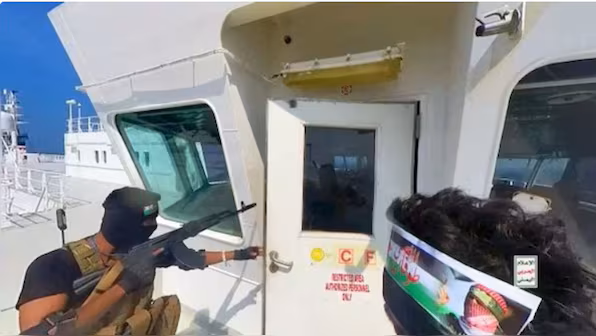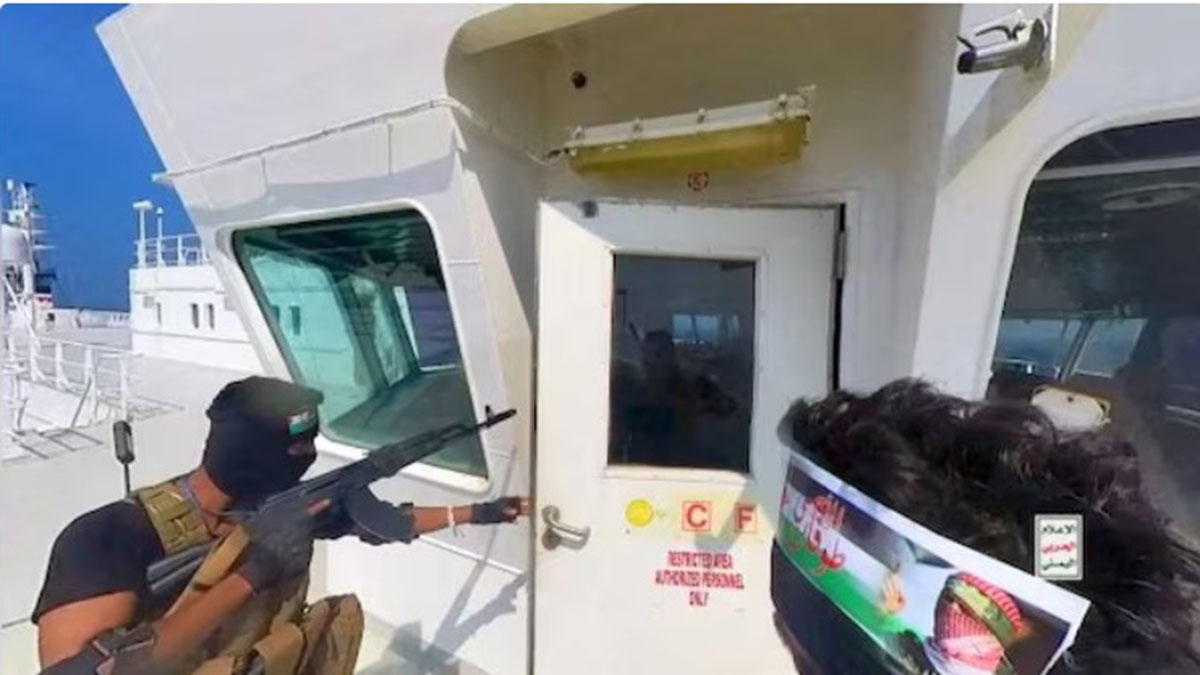Flags of ‘inconvenience’: Why are Indian sailors paying the price?
- July 19, 2024
- Posted by: Ambassador Gurjit Singh
- Category: India

India’s booming supply of seafarers seeking global opportunities is colliding with the dark side of flags of convenience. While these open registries offer cheaper operation costs, lax regulations often result in exploitative labour practices and leave seafarers vulnerable in crisis situations
)
)
Many Indian sailors have faced threats to their lives due to hijacking of ships overseas
For the second consecutive year, Indians are among the most abandoned seafarers. This year alone, 411 Indian sailors have reportedly been abandoned on destitute ships. There are currently over 116 such abandoned vessels, with a total of 1,672 seafarers stranded on board. According to the International Transport Workers Federation (ITF), 2024 may see the highest number of abandoned ships ever recorded. In 2023, 1,983 sailors were abandoned on 129 ships, a record at the time. Of those, 401 were Indian, a number already surpassed this year with 411 Indians abandoned.
Advertisement
Among recent ships abandoned with Indians aboard are those registered in the UAE and Tanzania. The ITF says that of the 116 ships currently abandoned at sea, 75 per cent are registered under flags of convenience (FOCs). This increasing use of FOCs often leads to lower governance standards being adopted by countries lending their flags. That India is among the top three seafaring countries makes for a problematic mix. The Director General of Shipping of India noted that Indian seafarers comprise about 10 per cent of the global maritime workforce, placing India just behind China and the Philippines. Furthermore, there has been a surge of over 40 per cent in the number of Indians employed as sailors since 2013.
While China has nearly 33 per cent of the world’s sailors, most of them are on Chinese-flagged vessels. A large number of Indian sailors work on globally registered ships. About 2,50,000 Indians, of whom 1,60,000 have professional certificates, are working on cargo ships. Nearly 90,000 Indians are working on cruise ships which are again seeing a post-COVID growth.
This success in placing Indian nationals within the global maritime sector stems from a well-organised system of licensing, training, oversight of flagged vessels, and port controls, all of which make it easier for India to be a part of this growing maritime opportunity. There is an anticipation that Indian sailors could double to 20 per cent by 2035 as India has good training establishments, a growing educated population, a decline in seafarers from ageing societies and English proficiency among young Indians.
Advertisement
While India boasts over 160 marine training institutes, only half of their capacity is currently being utilised. The Ukraine-Russia crisis significantly diminished the availability of sailors from those countries, who previously constituted nearly 15 per cent of the global workforce. This shift has, in turn, created new opportunities within the industry.
An area where there is a growing concern is that agencies in India place sailors without much due diligence, leading to placements within small companies which default or go into bankruptcy and consequently Indian sailors are abandoned in poor conditions. Search for a better life starts with getting a period of service and certification so it seems that agents have an easy time getting fresh Indian sailors to join any company without credentials being checked.
Advertisement
What are flags of convenience? This is the system where ships register themselves in states where regulatory requirements are weaker and easier. This particularly involves environmental and labour standards.
Flags of Convenience (FOCs) are more accurately referred to as Open Registries. The UN Convention on the Law of the Sea (UNCLOS) guides the requirement for all ships to be registered in a recognised ship registry and to sail under the flag of their country of registration. Thus, a vessel’s legal standing is directly tied to the flag it flies, representing its country of registration. As per UNCLOS, countries having ship registries need to have jurisdiction and control over the administrative, technical and social matters of ships flying their flag on the high seas. The ship’s flag determines what laws are applicable to it unless it is in a port, where stricter regulations may apply.
Advertisement
Therefore, ships are often abandoned on the high seas by companies that utilise open registries. Adopting a registration arbitrage by shipping companies has become common but is not illegitimate per se. Nevertheless, there is growing evidence that FOCs are being used more by ships that have something to hide to avoid oversight, perhaps undertake illicit activities and avoid scrutiny. Some FOCs are so anonymous and difficult to track that due diligence on ships registered there is difficult. FOCs are often used to obscure ownership and preserve anonymity.
An experienced captain told me that owners mostly register their vessels under FOC to save taxes and to keep old ships in service for longer periods than permitted under safety standards. FOCs are not as strict about periodic dry docking, quality inspections, hygiene, and safe working conditions. Crews are often denied their right to join unions and forced to work for extended periods, often without home leave. Old vessels are often abandoned by unscrupulous owners, without food, water or fuel for running. Onboard electricity generators are used for ease of trading in embargoed countries and war zones.
Advertisement
Countries with FOC ships rarely get involved in negotiations during hijackings or defending against piracy.
FOCs provide possibilities for lower costs of operation. In some cases, these gains are transferred to cargo companies, whose shipment costs decrease. But now the original ownership is being targeted, rather than the flag, as can be seen from the manner in which the Houthis have attacked shipping supposedly linked to Israel despite other flags flown by the ships.
As per UNCTAD, the most popular FOCs are of Panama, Liberia and the Marshall Islands. 44 per cent of global cargo capacity in 2022 was carried by ships registered in one of these three countries. In comparison, China, among the world’s largest trading countries, had 5 per cent of total shipping capacity. Panama and Liberia both have about 15 per cent share of the global maritime freight traffic, the Marshall Islands has 13 per cent and Hong Kong 9.5 per cent. Singapore has 6 per cent, China and Malta 5.2 per cent each and the Bahamas 3.3 per cent. As of December 2022, 486 Indian-registered vessels of 12.11 million GT were deployed on overseas trade. Of the global shipping of 11 billion tonnes, this is a small percentage showing that foreign vessels are important for Indian shipping and seafarers. Some countries see this as a good business proposition. Even if they have no known shipping companies, they don’t mind providing an open registry to bring in revenue and provide savings to shipping companies.
Of the 42 open registries recognised by the ITF Fair Practices Committee, 13 are in the Caribbean and several in the South Pacific. Comoros, Tanzania, Mauritius, Equatorial Guinea, Togo, Sao Tome and Principe, Cameroon, Liberia and Sierra Leone are among the African countries to which landlocked Eswatini (former Swaziland) has now been added.
Since India has a growing number of seafarers and the largest number of affected sailors, it needs to understand the FOC problems clearly. Sailors signing up on ships registered in FOCs are likely to have lower salaries, less-than-ideal conditions on board, challenges with food and water and uncontrolled working hours. This is because ship owners have the advantage of lower regulation, cheaper registration fees, tax exemptions and the ability to employ cheap labour using arbitrage across the globe.
India needs to have its own fair-trade list of FOCs and proactively advise seafarers against engaging with agencies that lack transparency or employ unethical recruitment tactics. The kind of problem faced by Indian migrant workers in the Gulf and elsewhere needs to be studied and similar issues must be avoided. This includes establishing robust advisories and a mandatory registration system for recruitment agencies to ensure accountability and safeguard the rights of Indian seafarers.
India’s growing population necessitates exploring diverse employment opportunities, and the global maritime sector presents a promising avenue. However, protective facets need to be built into this policy.
The writer is a former ambassador to Germany, Indonesia, Ethiopia, ASEAN and the African Union. He tweets @AmbGurjitSingh. Views expressed in the above piece are personal and solely those of the author.
